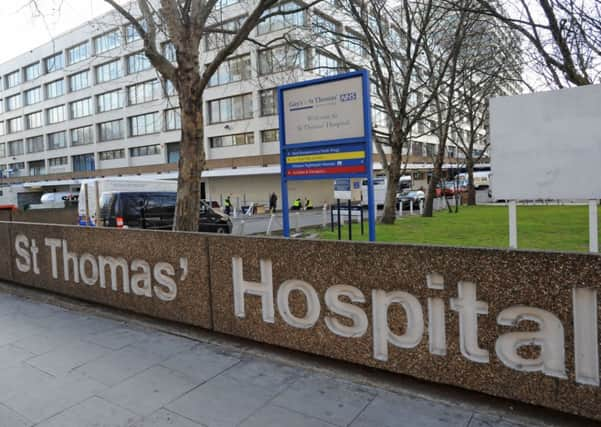Rogue feed may have infected more babies


The baby died from blood poisoning on Sunday after being infected by a suspected contaminated drip, a spokeswoman for Guy’s and St Thomas’ NHS Foundation Trust said.
Fifteen babies in six hospitals across England developed septicaemia after being infected with the bacterium known as Bacillus cereus, Public Health England (PHE) said.
Advertisement
Hide AdAdvertisement
Hide AdAn investigation is under way but PHE has “strongly linked” the cases with a number of batches of a particular form of intravenous liquid called parenteral nutrition, made by London-based ITH Pharma, which was given to the babies.
Dr Deborah Turbitt of PHE told Good Morning Britain that the organisation is “fairly confident” that the problem has been contained, saying: “We think we know all of the babies who have been affected at the moment.
“It is just possible that one or two babies have been infected and have been treated who have not been notified to us. We are confident that we know where this product has gone and all of the hospitals have been notified.”
Parenteral nutrition is supposed to deliver a variety of nutrients intravenously when a baby is unable to eat on its own.
Advertisement
Hide AdAdvertisement
Hide AdThe nutritional feed is sent out to different units that are looking after small, often vulnerable, babies and is made up on a daily basis for each newborn.
Dr Turbitt said: “We are fairly confident in talking with the company that manufactured the product that there was a single incident that happened on a single day to a limited number of products that went out to babies.”
Many of the babies were premature and very vulnerable.
PHE said investigations with the company have identified “an incident that might have caused the contamination” and the Medicines and Healthcare products Regulatory Agency (MHRA) confirmed that an investigation has been launched.
There are also four cases at the Chelsea and Westminster Hospital and one at the Whittington Hospital, both in London; three at the Royal Sussex County Hospital in Brighton; two at Addenbrooke’s Hospital in Cambridge; and two at Luton and Dunstable University Hospital in Bedfordshire.
Advertisement
Hide AdAdvertisement
Hide AdAll are responding well to antibiotics and their parents have been informed, the hospitals said.
ITH Pharma’s managing director Karen Hamling said the company is “saddened” by what has happened and is fully co-operating with the investigation into the baby death.
The baby died at St Thomas’, a day after being diagnosed.
Two others have been affected by the infection at the central London hospital, with those babies responding well to antibiotics.
In a statement, Ms Hamling said: “ITH Pharma is very saddened to hear about the death of a baby in hospital, and that 14 others are ill with septicaemia.
Advertisement
Hide AdAdvertisement
Hide Ad“ITH Pharma is a specialist manufacturer of parenteral nutrition, which is given to babies in neo-natal intensive care units.
“The products in question, which are no longer in circulation, are made to order for individual patients on a daily basis, in response to bespoke orders from hospitals.
“We are co-operating fully with the MHRA in the investigation, and are doing everything we can to help them establish the facts in this case as quickly as possible.”
The manufacturer has issued a recall and the MHRA has issued an alert to draw attention to that product recall.
Advertisement
Hide AdAdvertisement
Hide AdDoctors have also been given advice on identifying any potential cases of infection and how to dispose of affected stock.
PHE’s incident director Professor Mike Catchpole described the situation as “a very unfortunate incident”, pointing out that PHE is working closely with the MHRA to investigate how these babies could have become infected.
He said: “Given that the bacteria is widely spread in the environment, we are continuing to investigate any other potential sources of infection. However, all our investigations to date indicate that the likely source of the infection has been identified.
“We have acted quickly to investigate this issue alongside the MHRA and we have taken action to ensure that the affected batches and any remaining stock of this medicine is not being used in hospitals.”
Advertisement
Hide AdAdvertisement
Hide AdAdam Burgess, manager of the MHRA’s defective medicines reporting centre, said: “We have sent inspectors to the manufacturer’s facility to carry out a detailed and rigorous inspection and we have ensured that the potentially-affected medicine is recalled.”